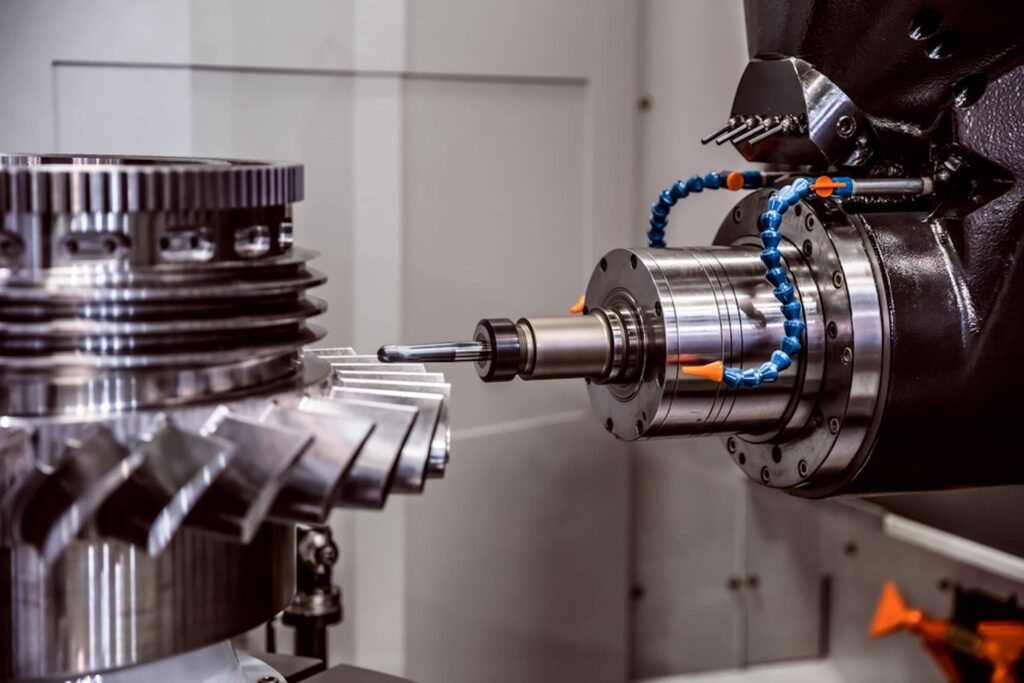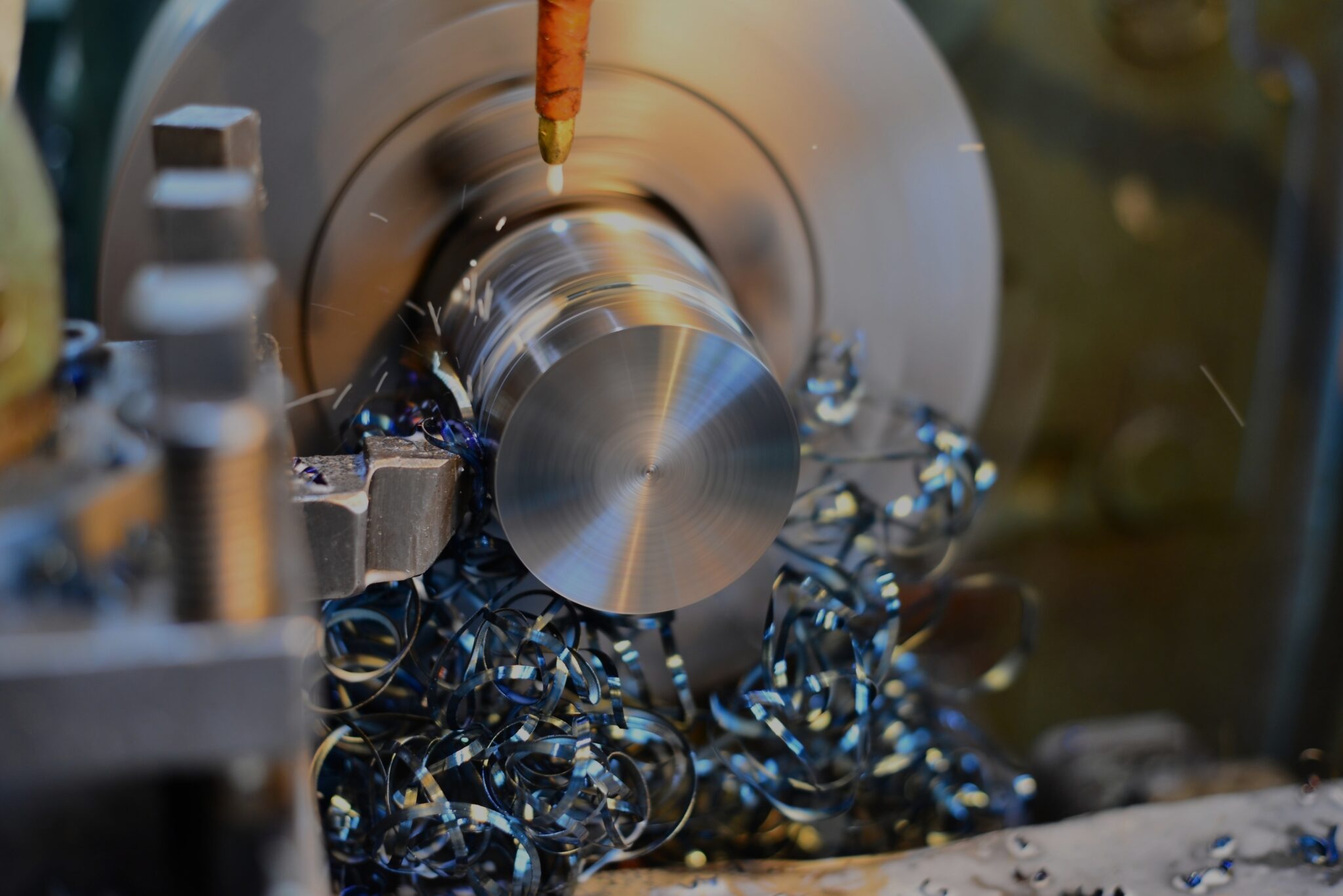Exactly How CNC Machining Providers Boost Effectiveness in Milling and Transforming Procedures
CNC machining services play an essential duty in boosting efficiency within milling and turning processes. By using automation and exact control, these solutions decrease human mistake and guarantee consistent output. The capability to manage complicated geometries and preserve tight resistances enhances manufacturing. The complete level of CNC innovation's effect goes past fundamental effectiveness gains. There are deeper ramifications and future patterns that require additional exploration.
The Basics of CNC Machining
CNC machining is an exact production procedure that uses computer-controlled devices to produce intricate components and parts. This innovation utilizes computer-aided design (CAD) software program to develop in-depth designs, which are then translated right into maker directions. The process typically entails numerous operations such as milling, turning, and exploration, allowing producers to achieve high degrees of accuracy and repeatability.
CNC devices are equipped with innovative tooling that can control materials like metal, timber, and plastic. They operate via a series of commands that dictate motions, speeds, and device modifications, minimizing human mistake and enhancing manufacturing effectiveness.
The automation inherent in CNC machining permits tight resistances and complex geometries to be constantly produced, making it a recommended choice in sectors requiring accuracy, such as aerospace and vehicle. Understanding the basics of CNC machining is important for valuing its role in contemporary production processes.
Advantages of CNC Machining in Milling
CNC machining supplies significant benefits in milling processes, particularly pertaining to precision and precision. This modern technology not only boosts production speed however likewise allows for the production of intricate designs that would certainly be testing to achieve manually. Because of this, businesses can improve performance and expand their abilities in production.
Precision and Accuracy
Attaining unequaled accuracy and precision in milling processes is a hallmark of sophisticated machining strategies. CNC machining services use computer-controlled systems that thoroughly implement layouts with minimal human intervention. This automation guarantees that each cut and contour is carried out to precise requirements, considerably decreasing the danger of errors normally linked with hand-operated milling. The capability to produce intricate geometries with tight tolerances is an essential advantage, enabling makers to satisfy rigid top quality requirements. In addition, CNC devices can preserve constant performance across multiple runs, guaranteeing uniformity in manufacturing. This degree of accuracy not only improves product quality but also lowers product waste, causing a lot more effective use of resources. Overall, CNC machining services change milling procedures with their commitment to accuracy and information.
Boosted Production Speed
Increasing production rate is one of the standout benefits of modern-day machining services. CNC machining considerably minimizes the time needed for milling procedures by automating operations and minimizing hand-operated intervention. Machines can run continuously, enabling boosted result without giving up quality. The capacity to program numerous jobs right into a solitary setup better enhances production, allowing producers to complete complicated jobs in much less time. Additionally, CNC equipments maintain high-speed reducing capabilities, causing quicker product elimination and faster cycle times. This improved performance translates to shorter preparations, enabling companies to react quickly to market demands. Overall, raised production rate through CNC machining not just increases performance however additionally enhances affordable benefit in the manufacturing market.
Complex Style Capacities
The ability to develop intricate styles is a significant advantage of modern-day machining solutions. CNC machining enables the production of intricate geometries that would be difficult, otherwise difficult, to achieve using standard approaches. This capacity stems from sophisticated programs and automated devices that specifically follow digital blueprints, making certain precision and repeatability. Therefore, manufacturers can create complex get rid of limited resistances, maximizing efficiency in numerous applications. Additionally, the flexibility of CNC machines enables fast modifications to develop specs without substantial retooling, simplifying the manufacturing procedure. This flexibility not just improves imagination in style however likewise permits effective testing and advancement, providing companies an one-upmanship in the ever-evolving market.

Advantages of CNC Turning Procedures
CNC turning procedures use significant benefits in manufacturing, specifically concerning accuracy and accuracy. These procedures permit the production of extremely described elements with marginal tolerances, making certain quality in manufacturing. Additionally, the performance of CNC turning adds to reduced lead times, making it possible for quicker distribution of finished items.
Precision and Accuracy
Precision and accuracy are characteristic qualities of CNC transforming processes, establishing them apart in the production landscape. These processes use computer system numerical control to assist reducing tools with unequaled exactness. This causes elements that fulfill stringent specs and resistances, lowering the possibility of mistakes. CNC transforming permits repeatable and consistent manufacturing, ensuring that each part is basically identical, which is important in markets needing high criteria, such as aerospace and clinical tools - jig and fixture tooling. Furthermore, advanced software application and modern technology enable real-time adjustments during machining, improving overall quality. By reducing human mistake and maximizing control over the manufacturing process, CNC turning services useful reference deliver superior accuracy and precision, making them a vital option for contemporary manufacturing needs
Decreased Lead Times
Decreased lead times are a significant advantage of CNC transforming procedures, originating from their capability to enhance and automate production. CNC turning devices operate with high efficiency, enabling quick arrangement and implementation of several tasks without the demand for considerable hand-operated intervention. This automation reduces downtime and accelerates the production procedure, allowing quicker turnaround for orders. In addition, CNC innovation enhances uniformity and minimizes errors, which further adds to quicker production cycles. As an outcome, organizations can satisfy tight target dates and respond promptly to market needs. By leveraging CNC turning procedures, business can improve operations, enhance resource appropriation, and eventually enhance their affordable edge via minimized lead times.
Precision and Accuracy in Production
While producing procedures have advanced significantly throughout the years, the value of precision and precision stays extremely important. In CNC machining, these 2 aspects are crucial to generating premium parts that meet precise requirements. The integration of advanced computer system modern technology permits precise control over machining criteria, ensuring you can look here that parts are crafted with very little deviation from intended layouts.
Accuracy in manufacturing refers to the repeatability of procedures, while precision denotes exactly how very closely a completed part lines up with its designated measurements. CNC machines utilize advanced software program and devices that allow manufacturers to attain both, noticeably lowering the margin for error - cnc turning service. This capacity is particularly important in markets such as aerospace, vehicle, and clinical, where also small errors can lead to devastating failures

Minimizing Lead Times With CNC Technology
CNC innovation accelerates manufacturing timelines by improving the machining procedure. By automating tasks, CNC machines decrease hands-on treatment, considerably reducing the moment required for setup and operation. This effectiveness enables makers to respond quickly to market demands, satisfying orders faster than standard machining methods permit.
Furthermore, CNC technology uses quick prototyping abilities, permitting quick models and adjustments based on customer feedback. The precision of CNC machining makes certain that parts are produced properly the very first time, reducing the chance of costly errors and remodel.
Progressed organizing and shows capacities enhance process, permitting numerous procedures to run simultaneously. This combination of innovation not only shortens lead times but additionally boosts total performance. Inevitably, the fostering of CNC machining services furnishes makers with the devices required to meet tight target dates while keeping high-grade requirements in production.
The Future of CNC Machining in Industry
As manufacturers significantly embrace CNC innovation to enhance procedures and minimize lead times, the future of CNC machining in market appears promising. Developments such as synthetic knowledge and equipment discovering are find out set to change the capacities of CNC makers, enhancing their accuracy and versatility. These developments will certainly assist in real-time monitoring and anticipating maintenance, decreasing downtime and enhancing production effectiveness.
The combination of Net of Things (IoT) modern technologies will allow far better data collection and evaluation, permitting producers to make informed choices that further improve functional efficiency. The increase of additive production alongside CNC machining is expected to match traditional methods, supplying better design versatility and product efficiency.
Additionally, as sustainability ends up being a top priority, CNC machining is evolving to integrate eco-friendly practices, which will draw in eco aware consumers. In general, the future of CNC machining is defined by continual technology and adjustment, positioning it as a cornerstone of modern manufacturing.
Often Asked Concerns
What Products Are Suitable With CNC Machining Providers?
CNC machining solutions work with numerous products, consisting of steels like titanium, light weight aluminum, and steel, in addition to plastics such as acrylic and polycarbonate. Timber and composites likewise fit CNC processes for varied applications.
How Does CNC Machining Contrast to Typical Machining Approaches?
CNC machining supplies greater automation, consistency, and precision contrasted to traditional approaches. It lowers human mistake, raises manufacturing speed, and enables for intricate designs, making it a remarkable selection in contemporary manufacturing environments.
What Industries Advantage one of the most From CNC Machining Solutions?
The aerospace, automobile, medical, and electronic devices industries benefit substantially from CNC machining solutions. These industries leverage rate, accuracy, and customization to enhance item high quality while reducing manufacturing costs and time, inevitably boosting total functional efficiency.
Can CNC Machines Take Care Of Complicated Geometries and Designs?
CNC makers are adept at taking care of complicated geometries and layouts, enabling accuracy and elaborate outlining. Their advanced programs capabilities allow manufacturers to produce parts with high accuracy, conference varied market needs and enhancing product capability.
What Is the Typical Price Range for CNC Machining Solutions?
The regular cost variety for CNC machining solutions varies commonly, usually falling between $50 to $150 per hour, depending upon variables such as material, complexity, quantity, and the details machining processes utilized.
CNC machining is a specific manufacturing process that utilizes computer-controlled makers to generate intricate parts and elements. CNC machining supplies substantial advantages in milling processes, especially pertaining to precision and accuracy. CNC machining significantly minimizes the time needed for crushing procedures by automating operations and reducing hands-on treatment. CNC innovation increases manufacturing timelines by streamlining the machining process. As producers progressively embrace CNC innovation to enhance procedures and minimize lead times, the future of CNC machining in market shows up appealing.